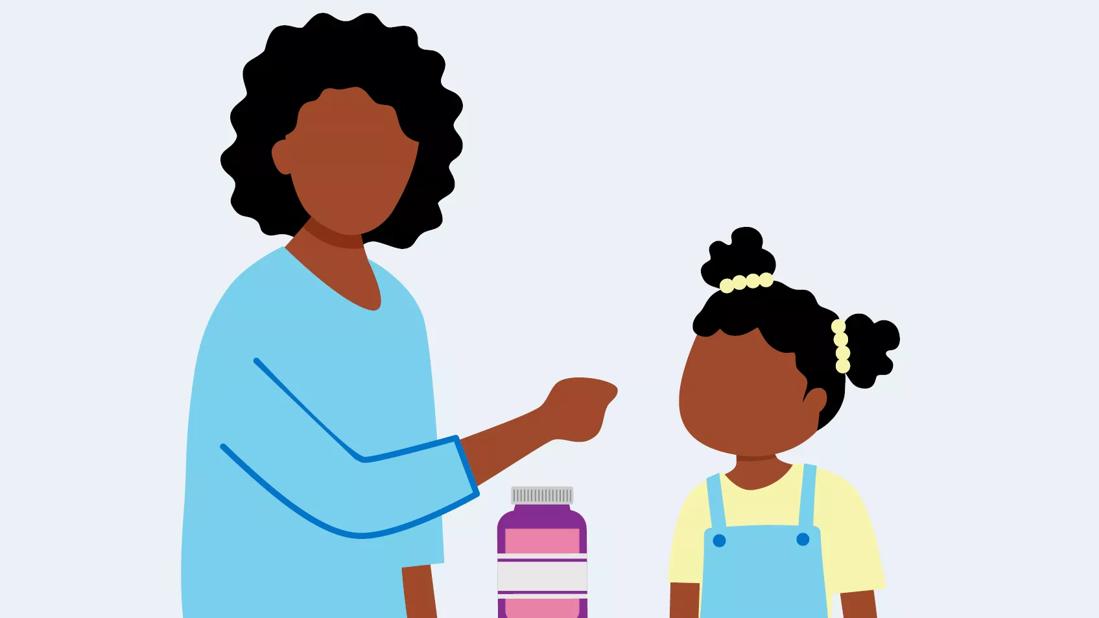Too much of the supplement can lead to an upset stomach, vomiting and diarrhea

Image content: This image is available to view online.
View image online (https://assets.clevelandclinic.org/transform/f4948be8-feee-42e7-af3d-f1463af8e727/Amounts-Melatonin-Overdose-Children-1404127061-770x533-1_jpg)
A drawing of a woman and child with a bottle between them
It’s bedtime, and again, you’re struggling to get your child to sleep. You’ve heard a melatonin supplement may help ease kids into dreamland.
Advertisement
Cleveland Clinic is a non-profit academic medical center. Advertising on our site helps support our mission. We do not endorse non-Cleveland Clinic products or services. Policy
So, do you reach for the pill bottle? And is it safe for kids?
A recent study by the U.S. Centers for Disease Control and Prevention (CDC) shows a 503% increase in pediatric melatonin ingestions from 2012 to 2021.
And for many parents, you may not be sure what the right dosage is, and that can lead to an accidental melatonin overdose. About 94.3% of those ingestions included in the study were accidental.
“A lot of people don’t view herbal supplements or vitamins as having any potential danger,” says pediatrician Gina Robinson, MD. “Because things are natural or because things aren’t prescription medications doesn’t mean that there can’t be some complications or dangers involved with using them.”
Dr. Robinson and pediatrician Timothy Benik, DO, explain the symptoms of a melatonin overdose in children and some alternative methods.
Melatonin, a hormone that’s naturally produced by your body to help calm you down and prepare for sleep, is produced by the pineal gland in your brain.
Melatonin supplements are sold over-the-counter and are available as tablets, liquid, capsules and gummies. But supplements aren’t fully regulated by the U.S. Food and Drug Administration (FDA). So, it’s important that you talk to your child’s pediatrician before using melatonin, says Dr. Benik. A provider can help determine the best dosage for your child and discuss any potential side effects.
Advertisement
Melatonin is usually well-tolerated but here are some signs of an overdose to watch out for:
“If a dose is too high or a child doesn’t tolerate melatonin well, parents can be alarmed at the symptoms,” says Dr. Benik.
Typically, most symptoms will resolve on their own.
“But if you’re concerned, the best thing to do is to call your local poison control center and get advice for the situation that you’re in,” advises Dr. Robinson.
In some cases, a melatonin overdose may be a more serious situation. The CDC study says about 1.6% or 4,555 children needed medical attention.
“Overall, this is very rare,” notes Dr. Benik. “It’s very hard to overdose on melatonin to a significant consequential extent.”
If your child is having trouble falling or staying asleep, before you turn to melatonin, Dr. Robinson and Dr. Benik both suggest speaking with your child’s pediatrician.
“I really stress that routine behavioral change be made first,” says Dr. Robinson.
Changes can include establishing (and following) a bedtime routine, teaching your child to self-soothe and including a transition period before bed (reading a book, taking a hot shower).
“Then you can start adding 1 milligram of melatonin, giving it at least one-and-a-half to two hours before you want your child to actually be asleep,” she says. “Because it takes time to actually get through the bloodstream and get to the brain and start to work.”
A pediatrician can also help determine if there are any other underlying causes that affect your child’s ability to sleep.
“Other sleep issues can include obstructive sleep apnea or tonsillar hypertrophy,” says Dr. Benik.
And how long and how often you use melatonin as a sleep aid for your child matters as well.
“I encourage parents to use it for only a short period of time — maybe a month or two — while they’re trying to readjust their patterns and behaviors,” says Dr. Robinson.
Overall, melatonin can be safe. But it’s important for parents to work on other behavioral changes, pay attention to the melatonin dosage they’re giving their children and keep an eye open for any overdose symptoms.
“Even though sometimes melatonin can be helpful, we always want to make sure that we’re not giving too much,” says Dr. Robinson.
Advertisement

Delivered every Tuesday!
Sign up for our Health Essentials emails for expert guidance on nutrition, fitness, sleep, skin care and more
Learn more about our editorial process.
Advertisement
While the supplement is safe, it’s best to talk to your child’s pediatrician first
This sleep supplement may have side effects, but dependency isn’t one
This hormone helps your body prepare for sleep
Does this supplement help you get more ZZZ's
A good source of melatonin, tart cherries may help you catch some ZZZs
What to expect after taking this increasingly popular sleep aid
A new study has some promising findings
The short answer from a sleep specialist
Type 2 diabetes isn’t inevitable with these dietary changes
Applying a hot or cold compress can help with pain
Pump up your iron intake with foods like tuna, tofu and turkey